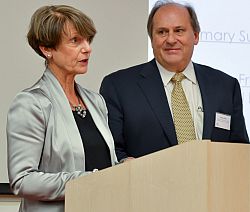Personal stories and advances in research revealed at adoption centre launch
A couple whose generous gift has helped to establish a major research centre at the University of Sussex on child adoption, described their own “adoption journey” at a special launch of the centre on Tuesday (1 April).
 Virginia and Andrew Rudd describe what motivated their interest in the study of adoption and the support of families and children whose biological families have been disrupted.
Virginia and Andrew Rudd describe what motivated their interest in the study of adoption and the support of families and children whose biological families have been disrupted.
The aim of the new Andrew and Virginia Rudd Centre for Adoption Research and Practice is to advance insights into the social, psychological, and community-based processes that play a role in the development of children and young people across multiple family contexts.
Speaking to an audience of eminent academics and researchers at the Brighton and Sussex Medical School’s Chowen Lecture Theatre on the Sussex campus, Virginia Rudd described how she and her husband, Sussex alumnus Andrew Rudd, adopted two babies more than 30 years ago before completing their family with two of their own biological children.
“Our experience brought with it an education we had not anticipated, and had not been prepared for, in the pre adoption process,” she said.
“As our children grew, we saw a number of differences in the ways our adopted children engaged with the world in comparison with our biological children. We had friends whose adopted children were also struggling in certain aspects of their lives despite being in enormously loving and supportive families.
“Many of these children tended to be hyper vigilant, suffered from high levels of separation anxiety, had trouble with trust which affected their relationships with friends and authority, they frequently had difficulty concentrating, had fragile self esteem and struggled with identity.”
Virginia, who trained as a teacher in Brighton, said they were also aware of the lack of understanding that seemed to prevail among the doctors, teachers, psychologists and social workers with whom they and their children came into contact.
“The attitude tended to be that the children were very fortunate to find themselves in circumstances that provided a secure and loving home and there had, therefore, to be something wrong with them. There was typically no recognition or acknowledgement of the fact that these children had suffered a very fundamental and profound trauma in their lives and needed help and informed understanding to cope with that fact and its effect on them.”
It was because of these experience that she and Andrew first set up the Rudd Adoption Research Program at UMass Amherst in the US. The work of the new Sussex centre will be directed towards advancing scientific knowledge, practice improvements and policy developments around vulnerable children and families.
Virginia said: “We felt that it was of enormous importance that more focus be placed on research, and especially the dissemination of that research, into the professions dealing with children in circumstances where they suffer a disruption in their biological family.”
Other speakers at the launch event included Professor Sir Michael Rutter, who discussed recent studies that showed institutional care may not be the major risk previously thought; Professor Anita Thapar, who presented the latest research on the interplay between genetics and environment; and Dr John Simmonds, who presented research and practice developments in the area of adoption and foster care.
Professor Gordon Harold, the inaugural Director of the Virginia and Andrew Rudd Centre at Sussex, gave an overview of some of the projects and activities already feeding into policy practice through the Centre, including international studies on adoption, foster care, adolescent depression, and family justice.
